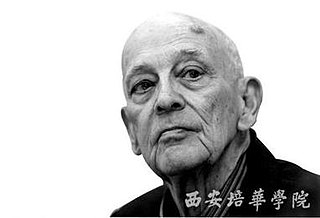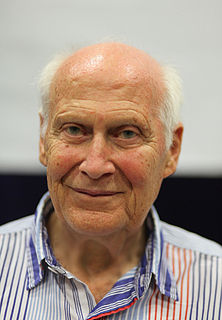A Quote by Oscar Wilde
There is no such thing as a good influence. Because to influence a person is to give him one's own soul. He does not think his natural thoughts, or burn with his natural passions. His virtures are not real to him. His sins, if there are such thing as sins, are borrowed. He becomes an echo of someone else's music, an actor of a part that has not been written for him.
Related Quotes
Some souls think that the Holy Spirit is very far away, far, far, up above. Actually he is, we might say, the divine Person who is most closely present to the creature. He accompanies him everywhere. He penetrates him with himself. He calls him, he protects him. He makes of him his living temple. He defends him. He helps him. He guards him from all his enemies. He is closer to him than his own soul. All the good a soul accomplishes, it carries out under his inspiration, in his light, by his grace and his help.
It is a fearful thing to hate whom God hath loved. To look upon another-his weaknesses, his sins, his faults, his defects is to look upon one who is suffering. He is suffering from negative passions, from the same sinful human corruption from which you yourself suffer. This is very important: do not look upon him with judgmental eyes of comparison, noting the sins you assume you'd never commit. Rather, see him as a fellow sufferer, a fellow human being who is in need of the very healing of which you are in need. Help him, love him, pray for him do unto him as you would have him do unto you.
A man of discernment, meditating on the healing Divine Providence, bears with thanksgiving the misfortunes that come to him. He sees their causes in his own sins, and not in anyone else. But a mindless man, when he sins and receives the punishment for it, considers the cause of his misfortune to be God, or people, not understanding God's care for him.
Another editor. That thing behind his ear is his pencil. Whenever he finds a bright thing in your manuscript he strikes it out with that. That does him good, and makes him smile and show his teeth, the way he is doing in the picture. This one has just been striking out a smart thing, and now he is sitting there with his thumbs in his vest-holes, gloating. They are full of envy and malice, editors are.
The natural inclination of man is to rely solely upon himself and to ignore the purpose of his existence as well as his relationship to God who is his spiritual father. If man will recognize his divine origin, he will then realize his Heavenly Father will not leave him alone to grope in darkness of mind and spirit, but will make available a power to influence him in right paths and into standards of good behavior. The Holy Ghost is that power.
Man is an Animal, formidable both from his Passions and his Reason; his Passions often urging him to great Evils, and his Reason furnishing Means to achieve them. To train this Animal, and make him amenable to Order; to inure him to a Sense of Justice and Virtue, to withhold him from ill Courses by Fear, and encourage him in his Duty by Hopes; in short, to fashion and model him for Society, hath been the Aim of civil and religious Institutions; and, in all Times, the Endeavour of good and wise Men. The aptest Method for attaining this End, hath been always judged a proper Education.
A truly humble man is sensible of his natural distance from God; of his dependence on Him; of the insufficiency of his own power and wisdom; and that it is by God's power that he is upheld and provided for, and that he needs God's wisdom to lead and guide him, and His might to enable him to do what he ought to do for Him.
"If a man finds it very hard to forgive injuries, let him look at a Crucifix, and think that Christ shed all His Blood for him, and not only forgave His enemies, but even prayed His Heavenly Father to forgive them also. Let him remember that when he says the Pater Noster, every day, instead of asking pardon for his sins, he is calling down vengeance on himself."
The government of the enlightened king? His achievements blanket the world but appear not to be his own doing. His transforming influence touches the ten thousand things but the people do not depend on him. With him there is no promotion or praise - he lets everything find its own enjoyment. He takes his stand on what cannot be fathomed and wanders where there is nothing at all.
A bath in Ganges undoubtedly absolves one of all sins; but what does that avail? They say that the sins perch on trees along the banks of the Ganges. No sooner does the man come back from the holy waters that the old sins jump on his shoulders from the trees. The same old sins take possession of him again. He is hardly out of the waters before they fall upon him.
When the family has been brought into its natural order, the individual can leave it behind him while still feeling the strength of his family supporting him. Only when the connection to his family is acknowledged, and the person's responsibility seen clearly and then distributed, can the individual feel unburdened and go about his personal affairs without anything from the past weighing him down or holding him back.
To free a man from suffering, he must be set right, put in health; and the health at the root of man's being, his rightness, is to be free from wrongness, that is, from sin. A man is right when there is no wrong in him. I do not mean set free from the sins he has done: that will follow; I mean the sins he is doing, or is capable of doing; the sins in his being which spoil his nature — the wrongness in him — the evil he consents to; the sin he is, which makes him do the sin he does.
What men and women need is encouragement. Their natural resisting powers should be strengthened, not weakened ... Instead of always harping on a man's faults, tell him of his virtues. Try to pull him out of his rut ... Hold up to him his better self, his real self that can dare and do and win out! ... People radiate what is in their minds and in their hearts.
A man who gives way to his passions is like a man who is shot by an enemy, catches the arrow in his hands, and then plunges it into his own heart. A man who is resisting his passions is like a man who is shot by an enemy, and although the arrow hits him, it does not seriously wound him because he is wearing a breastplate. But the man who is uprooting his passions is like a man who is shot by an enemy, but who strikes the arrow and shatters it or turns it back into his enemies heart.






































